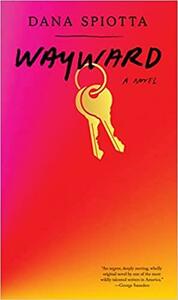Take a photo of a barcode or cover
emotional
reflective
medium-paced
Plot or Character Driven:
Character
Strong character development:
Yes
Loveable characters:
Complicated
Diverse cast of characters:
Yes
Flaws of characters a main focus:
Yes
This was a great story, and very relatable to women in middle age, whether or not they've just left their husband. There are sections where it kind of goes off on a poetic tangent - these parts are deep and meaningful, but they feel like having your mind drift off on something not entirely related to what you're doing. That tendency was a bit annoying, but didn't ruin it for the rest of the story.
A woman in her early 50s comes across an old decrepit house for sale in her hometown of Syracuse, NY, and on impulse buys it. She leaves her husband and teenage daughter and moves in to this abandoned property, choosing a bohemian lifestyle to replace the comforts of suburbia. But there is more going on here, and it was fun exploring her character.
emotional
reflective
fast-paced
Plot or Character Driven:
Character
Strong character development:
No
Loveable characters:
Complicated
Diverse cast of characters:
No
Flaws of characters a main focus:
Yes
emotional
medium-paced
Plot or Character Driven:
Character
Strong character development:
Yes
Loveable characters:
Complicated
Diverse cast of characters:
No
Flaws of characters a main focus:
Yes
2.5 / 5.0
Looking back on 2021, I didn't read as many good books as I have in past years. There were a few highlights--Fake Accounts, Shuggie Bain, Appleseed--and I consciously read more non-fiction. But, an ordinate number of the books I read felt like slogs, taking longer to read than I expected and ultimately feeling neither rewarding nor resonant.
Unfortunately, Wayward, my first book of 2022, felt in line with my past year of reading. I sort of liked Spiotta's writing-or, at least, I found it engaging enough (I read this book over the course of a long weekend). And the idea of coming into oneself as one ages (e.g., the protagonist, Clara Loomis), which Spiotta explores, is an interesting idea. But, everything else rang pretty hollow for me. Spiotta introduces subplots on such important contemporary issues as police violence, Me Too, consent, urban development--and seems to have nothing interesting or unique to say about any of them. Spiotta's discussion of these issues seems tangential and perfunctory--a simplistic acknowledgement of privilege, without real exploration or further probing.
Spiotta's writing style, at times, felt similarly performative. The first few parts alternate between Sam's (the protagonist) and Ally's (Sam's daughter) perspectives; but the last few parts include one on Clara Loomis--a fictional 19th-century feminist and eugenicist--told from pamphlets written by Sam, and one on the city of Syracuse. It's an interesting shift (and lends us further insight into Sam), but, taken in the last forty pages, feels weird and misplaced. Relatedly, I thought Spiotta had difficulty writing from the perspective of persons other than Sam. In one Ally part, the daughter writes a college essay/breakup letter that did not feel like the work of a teen (i.e., a teen would never write that, and, moreover, the voice did not feel like that of a teen)--it kind of reminded me of that part of Freedom, where Franzen tries to write from a young woman's perspective, but the voice very much remains Franzen's.
I didn't hate Wayward. The first fifty pages drew me in, and I felt like Spiotta's starting premise (a perimenopausal woman tentatively stepping away from her life, and moving into an old home) was sort of interesting. But, beyond that, I didn't feel like there was much there.
Looking back on 2021, I didn't read as many good books as I have in past years. There were a few highlights--Fake Accounts, Shuggie Bain, Appleseed--and I consciously read more non-fiction. But, an ordinate number of the books I read felt like slogs, taking longer to read than I expected and ultimately feeling neither rewarding nor resonant.
Unfortunately, Wayward, my first book of 2022, felt in line with my past year of reading. I sort of liked Spiotta's writing-or, at least, I found it engaging enough (I read this book over the course of a long weekend). And the idea of coming into oneself as one ages (e.g., the protagonist, Clara Loomis), which Spiotta explores, is an interesting idea. But, everything else rang pretty hollow for me. Spiotta introduces subplots on such important contemporary issues as police violence, Me Too, consent, urban development--and seems to have nothing interesting or unique to say about any of them. Spiotta's discussion of these issues seems tangential and perfunctory--a simplistic acknowledgement of privilege, without real exploration or further probing.
Spiotta's writing style, at times, felt similarly performative. The first few parts alternate between Sam's (the protagonist) and Ally's (Sam's daughter) perspectives; but the last few parts include one on Clara Loomis--a fictional 19th-century feminist and eugenicist--told from pamphlets written by Sam, and one on the city of Syracuse. It's an interesting shift (and lends us further insight into Sam), but, taken in the last forty pages, feels weird and misplaced. Relatedly, I thought Spiotta had difficulty writing from the perspective of persons other than Sam. In one Ally part, the daughter writes a college essay/breakup letter that did not feel like the work of a teen (i.e., a teen would never write that, and, moreover, the voice did not feel like that of a teen)--it kind of reminded me of that part of Freedom, where Franzen tries to write from a young woman's perspective, but the voice very much remains Franzen's.
I didn't hate Wayward. The first fifty pages drew me in, and I felt like Spiotta's starting premise (a perimenopausal woman tentatively stepping away from her life, and moving into an old home) was sort of interesting. But, beyond that, I didn't feel like there was much there.
reflective
slow-paced
Plot or Character Driven:
Character
Strong character development:
Yes
Loveable characters:
No
Diverse cast of characters:
No
Flaws of characters a main focus:
Yes
Book was alright, and the ending was weak. I had to keep reminding myself that just because I didn’t like the narrator shouldn’t mean that I don’t like the book
It leaned harder into strong feminist themes than it did character development or plot.
What I thought would be an ode to Syracuse and a book about aging was a mixed bag of every social issue that has happened in the last five years. There was no depth to what felt like endless plots and sub-stories, to the point where a lot were incomplete; the author just paid lip service to any and all hot topics. Also, the brochures about Syracuse history and Clara Loomis letters at the end were bizarre, and not in an artistic way. Every character was insufferable and flat. Several of them I did not understand what their purpose or their story line was. I hate read the last 2/3 of this novel and only made it through because it was short. The ending was cheesy, unrealistic, and convenient. The only things I did enjoy were the wildly specific Syracuse references (like the Talbots in DeWitt, the detail of the intersection of Bridge St. and Erie Blvd., and several Post-Standard/Syracuse.com references).




